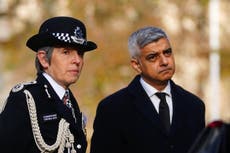Cressida Dick resignation: Priti Patel says new Met Police commissioner must tackle ‘institutional issues’
Home secretary says she is committed to choosing the ‘right leader for the largest police force in the UK’
The next leader of Britain’s biggest police force must tackle the internal “culture” behind a string of scandals, the home secretary warned as it emerged the process of finding a replacement for Dame Cressida Dick could take months.
Priti Patel said that the next Met chief would face “stark challenges”, amid falling public confidence over allegations of misogyny, racism and the handling of “Partygate”.
She said strong leadership was needed to restore public confidence following a “series of appalling incidents and too many historical cases involving serving Met Police officers”.
“The public in London and across the entire country must once again have confidence in the integrity and professionalism of the police officers who serve them,” she added.
“Policing culture and conduct have rightly come under scrutiny. Be in no doubt that a new leader must tackle these institutional issues.”
The Home Office has had to rapidly stand up a recruitment process for the next commissioner, which was not expected to take place until Dame Cressida’s contract extension ended in April 2024.
The appointment is expected to take months, rather than weeks, as the post has to be publicly advertised and subject to an open competition.
The Metropolitan Police commissioner is appointed by the home secretary, but she must have ‘“due regard” for the mayor’s views under official processes.
There were tributes to Dame Cressida from senior police officers on Friday, praising her service, while critics hailed her departure as an important step towards accountability and change.
The commissioner had maintained her post during a barrage of scandals, from the murder of Sarah Everard to an officer outed as a member of a neo-Nazi terrorist group, rashes of fatal teenage stabbings and the endless murders of women, including one under the supposed protection of a Stalking Protection Order.
The commissioner was also haunted by ghosts of the past, as the Metropolitan Police’s previous wrongdoing was pored over by a succession of damning inquiries that sparked accusations of “institutional corruption”, homophobia and incompetence.
Misogyny among officers came under renewed focus after it emerged that constables had shared photos of two murdered sisters’ bodies, and a damning report last week revealed horrific behaviour at Charing Cross police station.
The mayor of London said that he “made clear the scale of change urgently required” to address racism, sexism, homophobia, misogyny and bullying after the report was released.
“I am not satisfied with the commissioner’s response,” Mr Khan added. “On being informed of this, Dame Cressida has said she will be standing aside. It’s clear that the only way to start to deliver the scale of the change required is to have new leadership right at the top of the Metropolitan Police.”
He said he would “work closely” with Ms Patel on the appointment of a new commissioner, which is led by the Home Office due to the post’s wide-ranging responsibilities.
Dame Cressida said she would be staying on for a “short period to ensure the stability of the Met and its leadership while arrangements are made for a transition to a new commissioner”.
Her successor will arrive during an internal inquiry into the force’s “standards and culture”, a separate public inquiry sparked by Sarah Everard’s murder, a probe into abuses by undercover police and several criminal cases involving officers.
Scotland Yard is also contesting a legal challenge over its initial refusal to investigate Downing Street parties, as it awaits the result of a separate case over the handling of the Sarah Everard vigil.
Sir Peter Fahy, the former chief constable of Greater Manchester Police, said the extreme pressure currently on the Metropolitan Police could put applicants for the commissioner post off.
He told BBC Radio’s World at One programme: “I think there are some people that will look at that and either be put off by that degree of pressure or think that it is almost impossible to succeed, because you’re not getting the level of political support that recognises there needs to be fundamental reform in policing.”
Join our commenting forum
Join thought-provoking conversations, follow other Independent readers and see their replies
Comments


Bookmark popover
Removed from bookmarks